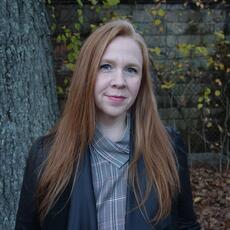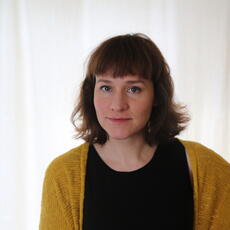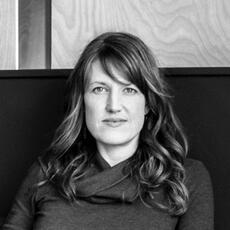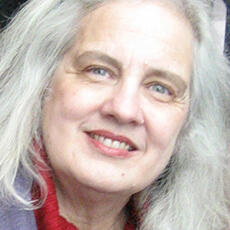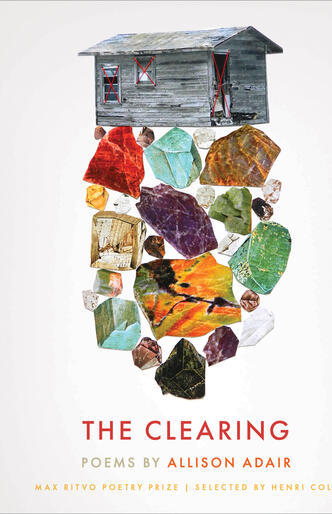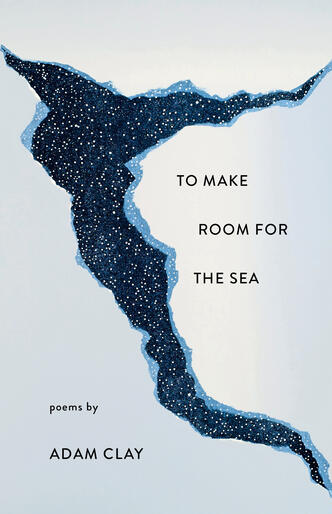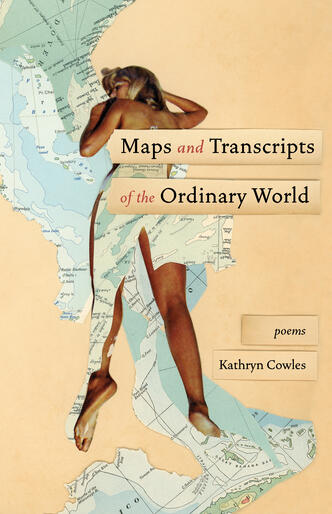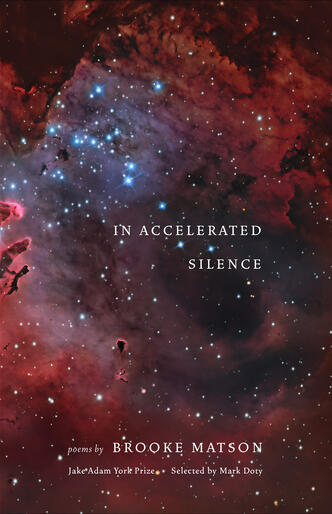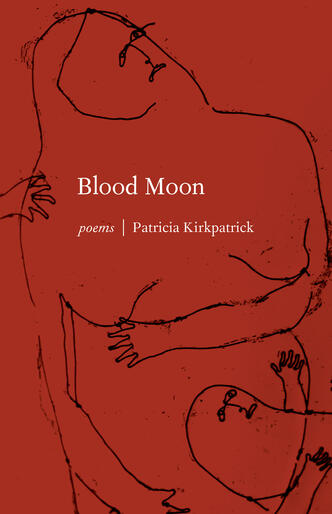Deep Cuts: Voice in a Time of Distance
Hello, friends, and welcome to another edition of Deep Cuts. In this series, we’ll be diving in with some of our authors and discussing the behind-the-scenes work that goes into the composition and production of their books. Oh, and real quick: this is Bailey Hutchinson, and I’m honored to be taking up the curatorial mantle for Julian Randall, the inaugural Milkweed Fellow, who created this series.
Friends, I’m feeling strange, and that’s in no small part because I’ve been alone in my apartment for over three weeks. It’s likely many of you find yourselves in a similar situation: self-isolation, while a crucial step in stopping the spread of the novel coronavirus, is a lonesome duty. I miss many things, but lately, I’ve been especially missing voices: the overheard laughter in public spaces, a coworker visiting my workspace to read me a poem, the niceties of a neighbor encountered on a walk—the absence of these things is creating a particular kind of ache in me.
That’s why for this edition of Deep Cuts, we asked a few poets to lend us their voices for National Poetry Month. Below, you’ll hear from beloved poets Allison Adair, Adam Clay, Kathryn Cowles, Brooke Matson, and Patricia Kirkpatrick reading from books we either recently published or will be publishing soon. We also sent these folks some questions to choose from to share a bit of wisdom on distance, connection, poetry, and voice as an added treat. So sit back, close your eyes, and listen—it almost feels like we’re all in a room celebrating these beautiful words together, doesn’t it?
Note: for best listening experience, please use Google Chrome.
“Ghazal for a Farewell Transmission” from To Make Room for the Sea by Adam Clay
BH: Our current moment is—to say the very least—an uncertain one. Right now, we’re all searching for something knowable and sturdy, and I wonder—does poetry (both the writing and reading thereof) fill that need for you? How?
AC: I’ve been writing a poem-a-day in April since 2009—it’s a welcome routine I’ve returned to each year, but I felt some resistance to do it this year, I have to admit. It felt like the poems might fall into some moments of tedium or repetition because of the pandemic. I asked my students to do it, though, so I felt like I needed to write alongside them. Now, just having wrapped up my seventh poem, I’m glad to be writing again. I’ve always liked how the act of writing daily trains the mind to experience the world differently, and I think the habit has been important for me. In this time of social distancing, I think I need it now more than ever. It’s easy to fall into the cycle of bad news, and I’m trying to write poems that take me away from my phone, whether that means watching a bird in the yard I’ve never seen before or trying to identify a plant that’s grown up in the yard that wasn’t there the day before. I’m not trying to escape or avoid what’s happening globally, but poetry provides a space for me to breathe in a crowded and congested day. I don’t know what will come of these thirty poems I’m writing, but they’re beginning to feel like a marker of this moment and where I’m finding myself in it.
“Map [Two-dimensional circles]” and “Three hours in a rocking chair outside the blue-roofed bunkhouse in the wind” from Maps and Transcripts of the Ordinary World by Kathryn Cowles
BH: “Voice,” to my mind, is at once one of the most distinctive aspects of poetry as a genre while also being one of its most abstract and indefinable craft elements. What do you understand “voice” to mean? Can you describe the “voice” of your book?
KC: I think you’re exactly right about the abstracted trickiness of voice. It’s funny, when I teach poetry workshops at my college, I see it as a sign of maturity when students start to cultivate a voice on the page that is recognizable and feels authentically theirs. But with my own poems, I become suspicious if I sound too much like me—if I’m just writing another version of a poem I’ve already written. So every time I start a new poetry project, part of the starting has been an attempt to step out into a new kind of talking—an attempt to say in a voice I’ve never used before. In practice, my poems probably still sound like me with every new project. But I think part of what sounds like me, part of my voice, is that stepping out of myself, that stretch.
For me, one purview of poetry, one of its main specialties, is its capacity to say something that’s not really sayable, at least not directly. And yet poets try to say it anyway, and something in the attempt is important and is human. This attempt to find the language to point at things that are just beyond language is at the heart of pretty much everything I write, and often, my projects are organized around new ways of attempting it. In Maps and Transcripts of the Ordinary World, in particular, I use forms reserved for fields other than poetry—maps and transcripts, yes, and recipes, guidebooks, photographs, glossaries, hymns, field guides—to get at things that are just beyond my capacity to say. Put another way, my words shoot “amiable love-arrows,” as Lyn Hejinian writes in “The Rejection of Closure,” at the things to which they refer. That shooting, that stretch beyond my voice, is maybe the most consistent thing about my voice.
“How to Eat a Pomegranate” and “Ode to a Rotten Apple” from In Accelerated Silence by Brooke Matson
BH: How does poetry’s aural potential impact your process? Do you think about how a line sounds out loud alongside how it sounds on the page, or does that come later in the writing?
BM: I like to joke that I am musically challenged as I don’t play any instruments and I cannot sing to save my life. But perhaps that’s not true as I see poetry as a musical art as much as a literary one.
When I am composing poetry, I pay great attention to sound as it accentuates the meaning of the line and sometimes adds new dimensions. I always begin writing by hand, then rewrite by hand several times as I read the poem aloud, much like a composer may play the first notes of a song they’re writing over and over on a piano, tweaking the sheet music. One can hear how rhyme, internal rhyme, hard or soft consonants, and meter all play off one another.
When I’m in the revision stage, I pace around, reading the poem aloud to myself. When I keep tripping up on a line or certain words get jumbled in my mouth, I know something is off. If in part of the poem, the sound isn’t very interesting, I’ll look at my word choice and attempt to punch up the sound by using a simile that adds a sonic dimension. Sometimes I can hear where a poem is begging for an internal rhyme or a meter that mirrors the last line. In those moments, I take five or ten minutes to brainstorm all the possibilities on paper, then try them aloud in my mouth. Often, I go with the phrasing that sounds the best, even if it may not be as accurate to the image. I have to trust that the reader’s imagination will do the work of imagery if I can deliver on the sound.
I do believe poetry is meant to be read aloud, not in one’s head, which is why I’ve developed the quirky habit of reading poetry books aloud to myself. One major pet peeve of mine is going to a poetry reading and hearing a very talented poet read their poems like they are reading out of a phone book: flat, monotonous, with no pauses or dramatic changes in volume. Reading poetry aloud should be like singing or preaching the gospel (if you’re into that). Deliver each line with gusto! If the poet has done their job on the sonic composition, the poem will captivate the ear of those who aren’t even fans of poetry, and mesmerize those who are. I heard Jericho Brown read his poem “Bullet Points” to a crowded room at the Portland Art Museum during the Portland Book Festival. Many people were just visiting the museum, not caring about poetry; but by the end of the poem, there had to be a hundred people standing still and quietly listening. Why? Because Jericho Brown is not just a master composer on the page, but phenomenal at bringing those sounds alive with his voice.
“Arriving in Baltimore,” “Baltimore, 2015,” and “Blood Moon” from Blood Moon by Patricia Kirkpatrick
BH: What do you understand “voice” to mean? Can you describe the “voice” of your book?
PK: Often when we talk about “voice” in a poem we mean the presence of the poet in the poem that includes everything a writer brings to the writing: craft, style, syntax and diction, the choice of subject, beliefs and values, even the creation of personality.
I like to think of voice as a matter of sound and use words for it that could describe any speaking voice. I’d describe the voice in the Blood Moon poems as quiet, calm, sometimes colloquial but even-toned, precise, yet uncharged. A voice of walking rather than running, perhaps. Sometimes that frustrated me as I wrote the poems. The voice comes out of silence and leaves much unsaid. It felt unfamiliar compared with others I’ve written. At the time I was working with many diverse writers, some well-known, some just emerging, some beginning not only to write but to speak English for the first time. We had many conversations about race. I decided I wanted to write poems in which the identity of the speaker as white is not assumed, for writer or reader, but is something to acknowledge and explore.
Writing about the moon and its eclipses, as well as birth and death, led to questions about what’s hidden, obscured, unspoken. Darkness, veils, illusion. Some poems aren’t written in a single voice but as a collage of voices, like the poem “The Moon, A Cento, A Cloak of Patches,” which arranges lines from other poets. “Baltimore, 2015” includes voices of students and a teacher, with lines from John Berryman. I hope there are surprises in the poems. A friend said she thought the poems’ diction and syntax [were] a foil for the questions and complexities raised in them. I’d like to think that’s true.
I do think the presence of a human voice, or voices, in poetry is one reason many of us turn to reading and listening to poetry in a time of distance. Poetry gives us company. Others have been here before. Others are with us now.
“After the Police Have Been Called” and “Crown Cinquain for a Lost Child, Eight Years Later” from The Clearing by Allison Adair
BH: How does poetry’s aural potential impact your process?
AA: I love how you have phrased this—aural potential. It calls up physics and how potential energy comes partly from proximity, from relationships. To me, sound in poetry is like that. Some sounds carry inherent meanings—like soporific sibilance—but many take their meanings from placement. That’s the poet’s job, and I think of it constantly when writing.
When Robert Frost says of a horse, “He gives his harness bells a shake,” that k sound is doing real work to cut off the line’s aspirated breeze. Dean Young plays with sound, too, in summing up the perils of the late Middle Ages: “Back then […p]eople died from infection of the finger./You couldn’t just go someplace warmer/in a helicopter.” A little bit of levity comes from the sudden inelegance—the absurdity!—of that grrrr sound in finger. What kind of tragic folly would it be to go out from a single digit?
“The sound must seem an echo to the sense,” Alexander Pope says, maybe the best answer to the question about sound in poetry. Tiana Clark is really good at using extended assonance or consonance to mire the reading in a feeling; her poem “BBHMM” is an advanced class. Of course, the sound-sense equation isn’t always a one-to-one. Sometimes sound disrupts or lends tension, going against the denotative meaning of a phrase, such as Andrew Marvell’s slow-growing “vegetable love.” Often sounds introduce a significance that lies beyond denotation, like a regional association. There are so many central Pennsylvania phrases I have hidden, celebrated, questioned, translated, and fought for in my writing: rid up, gumband, cover over, needs cut, onion snow. Some, like onion snow, describe a thing not seen or named elsewhere. Others offer a broader evocation of place or character, the way someone who smells like a wood stove tells a story just by walking into a room.
Keats insisted, “Axioms in philosophy are not axioms unless they are proved upon our pulses.” Rhythmic sound—with its thready, subtle suggestion of repetition—lends such a haunting feeling to a poem. There’s enough of a gesture toward familiarity that it approximates the uncanny (I think I’ve heard this somewhere before), but not so much that we become distracted by the poet’s engineering, by the artifice of the thing, which would take us out of the poem and distance us from the speaker.
Sometimes when writing I begin to feel this distance in my own work, and usually, it means the language has become too arch—often, too Latinate. If the river’s flowing without boulders to interrupt it, I’ve lost my way. The poet Kim Garcia sensitized me to this: she champions the power of a good Saxon blitz now and then, to get us out of our heads. Kim once told me to protect my moments of “plain speech,” and I took that to heart. In “Fable,” one of the poems in The Clearing, I remember coming up against this moment when writing. The description of spring had gone on and on about beauty and was so polysyllabic—words like honeysuckle, perfume, accreting, and profligate—that the poem needed a break. So I wrote, “The cold seems tired but has some good fight yet.” Something about that spondee clatter, not to mention the regional usage of yet, broke the poem’s heady spell and put it back in a hunting blind where it belongs.
